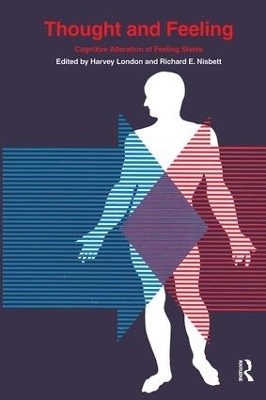
Thought and Feeling
Routledge (Verlag)
978-1-138-53964-8 (ISBN)
This book is divided into five sections, each of which elucidates and extends these theoretical conceptions. Part 1 provides a historical background and analytical framework for the rest of the book. Part 2 presents chapters dealing with the sorts of internal cues which may give rise to a feeling state. Part 3 presents a chapter discussing the evaluative needs aroused by the internal cues. Part 4 is concerned with the process of explanation triggered by the evaluative needs. Part 5 deals with various external cues and how they are used to label the internal feeling state. There is a concluding discussion of the cognitive alteration of feeling states.
The authors deal with aggression, boredom, obesity, the control of pain, and delusional systems. This volume is of continuing importance to clinical and experimental psychologists as well as social psychologists. Each of the authors takes the theoretical concept of cognition and relates it to research in biofeedback, physiology, social psychology, altered states of consciousness, etc. Thus, the book bridges the gap between cognitive theory and the use of that theory in applied research.
Richard E. Nisbett
I: Introduction; 1: Historical Background; 2: Elements of Schachter’s Cognitive Theory of Emotional States; II: The Nature of Internal Cues; 3: Influence of Future Choice Importance and Arousal Upon the Halo Effect; 4: Individual Differences in Self-Attribution of Emotion; 5: Cognitive Manipulation of GSR Extinction; 6: Cognitive Manipulation of Boredom; III: Evaluative Needs; 7: Delusional Thinking and Cognitive Disorder; IV: The Process of Explaining Internal Cues; 8: Opportunity for Information Search and the Effect of False Heart Rate Feedback; 9: Persistent Effects of Information about Internal Reactions; V: The Effects of External Cues; 10: Cognition, Affect, and Psychopathology; 11: Cognition and Self-Control; 12: Self-Persuasion and Fear Reduction from Escape Behavior; 13: Perceived Anger Level, Instigating Agent, and Aggression; 14: Cognitive and Social Determinants of Food Intake; VI: Discussion; 15: Cognitive Alteration of Feeling States
| Erscheinungsdatum | 19.12.2017 |
|---|---|
| Verlagsort | London |
| Sprache | englisch |
| Maße | 152 x 229 mm |
| Gewicht | 453 g |
| Themenwelt | Geisteswissenschaften ► Psychologie ► Allgemeine Psychologie |
| ISBN-10 | 1-138-53964-3 / 1138539643 |
| ISBN-13 | 978-1-138-53964-8 / 9781138539648 |
| Zustand | Neuware |
| Haben Sie eine Frage zum Produkt? |
aus dem Bereich


